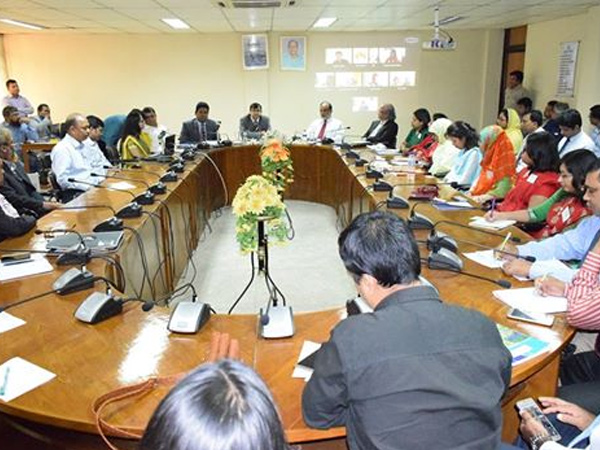“Before participating in the online training course organized by National Institute of Mass Communication (NIMC), I did not have any idea, even could not imagine that editing and recording of radio programs could be done so smoothly by using different software. We use “Qbase-5” software earlier for this job. The software is no doubt an advance one but the operating system is so critical! Now we can do the same job within a short time and very smoothly with the prescribed software “Adobe Audition 3.0” shared by NIMC.
We have learned the techniques to develop radio programs accessible for uploading in Face Book and YouTube and can send the same radio programs through email with the same resolution.” Mst. Lutfunahar, Assistant Producer of Community Radio Chimari has expressed her reaction in the closing session of the two-week online training course on “Digital Recording and Editing” organized by National Institute of Mass Communication (NIMC).
Today, 14 February 2017, the closing session of the two-week online training course on “Digital Recording and Editing” was taken place at the training room of National Institute of Mass Communication (NIMC). Md. Waliur Rahman, Director General, NIMC has presided over the event. Mr. Martuza Ahmed, Honorable Secretary, Ministry of Information, and AHM Bazlur Rahman, CEO, Bangladesh NGOs Network for Radio and Communication (BNNRC) attended as the Chief Guest and Special Guest of the closing ceremony respectively. Among others, Md. Nazrul Islam, Director (Training and Engineering) and Advisor “Pathyodhara”, Mr. Netai Kumer Bhattacharjee, Course Director “Pathyodhara” and Md. Abdus Salam, Course Coordinator & Asst. Programmer.
In his speech, Mr. Martuza Ahmed requested to DG, NIMC to initiate a Memorandum of Understanding (MoU) immediately between Union Digital Center, Community Radio Stations and NIMC for organizing this type of online training courses for the rural broadcasters and youth.
This is the second batch of the online training course organized by NIMC. The course was initiated on January 15, 2017 and concluded on January 26, 2017. A total of 18 participants from 12 different Community Radio stations have participated in the training course. Producers, Associate Producers, Sound Editors, Presenters and Reporters have participated in the training course virtually by staying at their stations. The contents of the course were focused on the skills on digital recording and editing. Among all 18 participants, Free Press Unlimited and BNNRC provided financial support for the course fee of 14 female participants.
The objectives of the training course were to upgrade the skills of digital recording and editing of the rural community broadcasters in Bangladesh. Besides, the course ensured a virtual training without papers and stationeries. The course was designed with 10 major lessons like Digital audio environment and its utility, steps of radio program, basic of audio software, terms used in digital environment, studio-based digital recording, outdoor digital recording, functions of editing process and editing using adobe audition. The sessions were conducted through video conferences and clips. Besides, the participants have scope to rectify their limitations through homework.
Mohammad Shamim Mridha, focal of Krishi Radio expressed, “Before participating in this training course we did a lot but the work was not up to the mark. For an example: we didn’t know how to create different formats for different types of program like song, address, drama etc. We captured all in the same attribute but from the course we came to know that for any speech we need to use in mono and for music need stereo.
We have learned about online broadcasting format, recording and editing level, multi tracking, perfect bit for recording, back ground music etc. Now we are confident enough to produce quality radio programs by our own. The video clips that we received during the training course will help us to face any critical situation in the future.”
The participants recommended that the course will be more useful if the sessions are conducted through face book and Skype conference instead mobile and or email.
